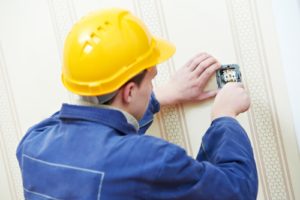Some folks love the peace of mind that comes with electrical inspections, while others procrastinate or outright avoid them. An electrical inspection is not a matter of nitpicking just because you can. It’s about making sure that everything is right, and it just might save your life.
Some situations require an electrical inspection, such as buying a home or making renovations. Every home needs an electrical inspection occasionally, however. Ask yourself these questions:
- Is your home more than 10 years old?
- Was your home previously occupied when you bought it?
- Have any electrical repairs been made by an amateur?
- Do you experience blown fuses or tripped circuit breakers?
- Have you added new major appliances since the home was built?
- Do you plan on selling your house or renting it out?
If you answered “yes” to any of those questions, you should get an electrical inspection to make sure you’re in the clear. Unless you’re the original owner of your home and you know for certain that all electrical work has been done professionally and up to code, you can’t be sure that everything is safe unless you get an electrical inspection.
Top Reasons to Get an Electrical Inspection
 We recommend calling a local electrician to inspect your electrical system about every 10 years. You also need an electrical inspection following any home improvement or remodeling project, regardless of whether it was DIY or professional.
We recommend calling a local electrician to inspect your electrical system about every 10 years. You also need an electrical inspection following any home improvement or remodeling project, regardless of whether it was DIY or professional.
Here’s why electrical inspections are so critical for you and your home:
- Prevent home electrical fires. The NFPA estimates an average of 420 deaths per year and $1.4 billion in damage from fires started by electrical problems.
- Prevent shock injuries. Bad electrical outlets, haphazard wiring, and other problems can lead to painful and dangerous electroshock injury for you or a family member.
- Save your appliances and electronics from damage. Overloaded circuits and faulty wiring can damage or ruin a computer, television, laundry machine, or HVAC equipment. Make sure you have the proper electrical wiring and circuits for major appliances.
- Discover outdated electrical components. Older homes may have aluminum wiring or even knob-and-tube wiring. At this point in time, these ancient systems are ticking time-bombs. At the least, it’s good to know that you’ll need new wiring in order to sell the home one day.
- Make code corrections at the earliest convenience. Better to get an electrical inspection on your own time and make the necessary repairs, rather than have a future home buyer find the code violations later!
- Find electrical “leaks.” You might be paying monthly for wasted electricity due to bad wiring. Electrical leaks typically only cost you a few dollars per month, but it’s also a symptom of electrical fire hazards, too.
What to Expect from an Electrical Inspection
Your electrician will take a close look at your electrical service panel to make sure that everything is properly sized and tightly connected. Examples of electrical inspection checkpoints include looking for undersized circuit breakers, missing GFCI protection in bathrooms and kitchens, and potential dangers like frayed wire insulation or spliced wires.
Simply put, we check to make sure that electricity can flow smoothly and safely through your electrical system. If repairs or alterations are necessary to conform to the National Electrical Code and California law, we make those recommendations and clearly explain the need.
Time to get an electrical inspection in Santa Rosa or the North Bay area? Contact us today to request an appointment.

